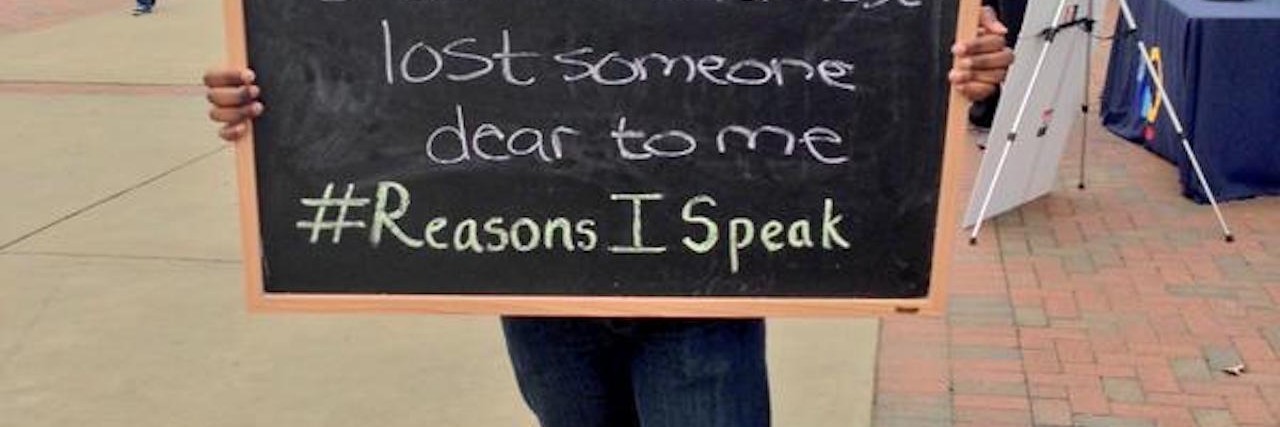7 Easy but Important Ways to Participate in National Suicide Prevention Week
During the week surrounding World Suicide Prevention Day on September 10, it’s time to speak up.
For the 41,149 Americans who took their own lives last year.
For the more than 800,000 people who die by suicide across the world each year.
For the countless more who have made suicide attempts or have lost a loved one to suicide.
National Suicide Prevention Week (Sept. 6 to Sept. 12) is an opportunity to confront these deaths as a nation, and work to get those numbers down through dialogue and action that puts suicide prevention in the forefront.
Don’t keep quiet. Here are seven things you can do to support suicide prevention during National Suicide Prevention Week:
1. Educate yourself about the signs of emotional distress, and be prepared when you see them.
“Everyone faces emotional challenges, but if you have a gut feeling it’s more than the everyday ups and downs, it’s important to reach out for help,” Dr. Victor Schwartz, Medical Director of the JED Foundation, told The Mighty in an email. He urges young people to take action this Suicide Prevention Awareness Week. “Learn about the warning signs of emotional distress and the steps you can take to get the support you or a friend may need. You don’t need to be an expert to make a difference.”
Schwartz recommended some resources that might help:
- Read the Help a Friend in Need guide to learn how to identify potential warning signs a friend might be in emotional distress and how to find help.
- Check out Half of Us for more information on various emotional health issues and how to be there for a friend
Helping a friend can also be as easy as texting. Text “START” to 741-741 if you’re worried about yourself or someone you know. Confidential support is available from Crisis Text Line 24/7.
2. Tell someone you’ll see them tomorrow and bring a World Suicide Prevention Day pack.
“Above all else, we choose to stay,” wrote To Write Love on Her Arms founder Jamie Tworkowski during last year’s Suicide Prevention Week. “We stay because no one else can play our part. Life is worth living. We’ll see you tomorrow.”
These words inspired this year’s To Write Love on Her Arms suicide prevention campaign. Their goal is to raise $75,000 by selling suicide prevention packs. According to their website, all the profit will go to treatment and recovery.
Each pack includes a shirt, a bracelet, three posters and informational cards. “Use them as conversation starters, encouraging reminders and informative tools to share with others,” its website says. Packs will be sold until September 13.
3. Join the conversation with #ReasonsISpeak
Why is it important to speak up about suicide? Join Active Minds and share your reason using the hashtag #ReasonsISpeak. The conversation is already happening. Here are some examples below:
I speak out about suicide because everyone should realize they're supposed to be happy. #ReasonsISpeak #spsm
— Jenn Haussler Garing (@JennGaring) September 3, 2015
The #ReasonsISpeak about suicide is because I am not the same. I can no longer let the silence rule my life. I no longer feel I am alone.
— Nikki Byrd (@deadpancharm) September 3, 2015
#ReasonsISpeak pic.twitter.com/VxRJWxM4uN
— Eh-oh (@ThatGuyDeas) January 22, 2015
4. Get creative and give someone a reason to stay.
Project LETS Inc., a nonprofit organization that supports students and young adults with mental illness, is collecting artwork, poetry, stories or anything that might give someone who’s considered suicide a reason to stay.
“It’s so important for us to know what keeps us alive and thriving. What makes us excited to continue living in the midst of what we deal with?” Stefanie Lyn Kaufman, founder of Project LETS Inc., told The Mighty. “In collecting reasons to stay, we hope to offer tidbits of wisdom, a collection of real, honest and true reasons to stay.”
You can submit your reason here, or share your reason using the hashtag #ReasonsToStay.
"To create things. To add color and light to the world." #ReasonsToStay pic.twitter.com/VqB4qWLqXV
— Project LETS (@projectlets) August 30, 2015
the look your pet gives you when they first see you in the morning #ReasonsToStay
— nicole (@nicole_iadevaia) August 24, 2015
5. Encourage your school or workplace to get screened.
Created by the American Foundation for Suicide Prevention, the Interactive Screening Program is an evidence-based way of reaching people who are at risk for suicide and connecting them to support and help, according to the American Foundation for Suicide’s website. The screening is in the form of an anonymous online self-check questionnaire, and universities and workplaces can use it to determine if someone in their community is at risk.
A counselor reviews the answers and provides an individualized response, opening the door to an anonymous online dialogue. This conversation could be the first step in receiving help.
Screenings not only identify individuals who might need help but also send a great message that your classmate’s or colleague’s mental health is important.
6. Support means restrictions.
A number of studies indicate that means restriction — taking action to limit fatal and often public methods of suicide — is a productive means of suicide prevention. California made great strides for suicide prevention recently by approving funding to build a suicide barrier at San Francisco’s Golden Gate Bridge. Cornell University has made similar modifications to the iconic Ithaca, New York, gorges. In the spring of 2010, Cornell installed chain link fences on seven bridges on or adjacent to the Ithaca campus.
If there’s somewhere in your town that’s known as a common spot for suicide, encourage officials to find a way to limit access and lower suicide rates.
7. Do your part to reduce the stigma surrounding mental health.
An overwhelming majority of people who die by suicide — 90 percent or more — had a mental disorder at the time of their deaths. But for those living with mental illness, suicide is not inevitable. When we speak up about mental health and create a culture where people can get help without shame, we give those with mental illness an opportunity to recover, manage and live their best life possible. Suicide is preventable, and we can work to make sure those at risk know they are not alone.
If you or someone you know needs help, see our suicide prevention resources.
If you need support right now, call the Suicide Prevention Lifeline at 1-800-273-8255.



